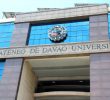The government hastens the privatization or commercialization of state colleges and universities by lowering the budget for these schools, who are forced to increase tuition and come up with all sorts of income-generating projects that have nothing to do with education. In the meantime, poor students and their families are caught in a bind. Davao Today staff writer Grace S. Uddin tells us why.
DAVAO CITY � The father of Charles Miras, a 19-year-old student at the University of Southeastern Philippines (USEP), works abroad. Each month, he sends 15,000 pesos back home. But the amount, according to Charles, is hardly enough to send him and his four other siblings to college.
Junjun Cruz, 22, also studies at USEP. He spends about 1,900 pesos every semester for tuition. He complains that his father is hard put to come up with the amount.
Junjun and Charles are both taking an industrial-technology course at the USEP. While they both agree that their parents are having difficulty providing for their education, they consider themselves lucky.
�If it weren’t for USEP, we won�t be able to go to college,� Charles said. USEP is a state university, mostly catering to poor students.
But things are changing at USEP — and pretty much in all of the country�s state colleges and universities. These are the result of, among other factors, the depreciating budget for these schools whose operations are paid for by the public.
One of the first effects are increases in tuition, which would have a huge impact, according to student leaders, on poor families who are, as it is, reeling from the high costs of practically everything.
Charles and Junjun were only paying 40 pesos per unit when they enrolled in 2003. The next year, the cost per unit for freshmen students increased to 60 pesos, then 80 pesos in 2005. This year, freshmen paid 100 pesos per unit � more than half of the fee just three years ago.
The education budget cuts, students said, will worsen the situation. Iskolar Ako!, a newly launched alliance of student groups from the various state colleges and universities (SCUs), opposes these budget cuts for education and for SCUs.
Raymond Basilio, the chairman of the UP Mindanao Student Council and Iskolar Ako!�s spokesman, said the government will slash the budget of SCUs to the lowest amount possible in order to hasten the privatization and commercialization of these schools. He said the government has already taken steps in withdrawing its responsibilities from poor Filipino students.
Once the government no longer pays for education of poor Filipinos, tuition and the cost of education in general will skyrocket, Basilio said. With the economy as it is, he added, more and more Filipinos will not be able to gain college education.
Basilio pointed out the proposal to increase tuition in all University of the Philippines campuses by as much as 300 percent. The planned hike, he said, would be finalized this month. The increase, according to UP administrators, is necessary because of the university�s meager budget.
Moreover, under the government�s �Long Term Higher Education Development Plan,� 70 percent of SUCs should be charging the same amount of tuition as their private counterparts by the year 2010. That is if these SUCs are not privatized in the first place.
Senate Bill 2587, or the UP Charter Change Bill authored by Sen. Francisco Pangilinan, is also being pushed through to step up UP�s privatization, Basilio said.
Alfie Keith Apalit, the chairman of USEP-Obrero�s Student Council, which joined Iskolar Ako!, said that if the privatization is consummated at the UP, it would have a domino effect on schools such as the USEP.
As it is, schools such as USEP are already feeling the crunch. Apalit disclosed a plan by the USEP Board of Regents Meetings to establish a call center inside the campus in the next two or three years. He said this is one of the school�s ways to generate income so as to sustain its operations.
�It may sound nice to hear students studying and earning at the same time but we denounced this plan because it diverts the school�s orientation to educate,� Apalit said. �Besides,� he added, �the government should be paying for the education of its people.�
Students from the USEP-Mintal Campus, the Cotabato City Polytechnic State College and the University of Southeastern Mindanao, who all joined Iskolar Ako!, also complained about rising �miscellaneous fees.�
�Sometimes, the increases in miscellaneous fees range from 100 percent to 500 percent,� Arnel Santander, student council president of USEP-Mintal, said. �During the first semester, we only had to pay five pesos for a particular fee, but now it has increased to fifty pesos,� he added.
With all these increases, the schools know that they would be facing opposition from students, which is why, according to Basilio, UP is pushing for the deliberation of the increase during the semestral break this month.
Iskolar Ako!, in fact, was formed precisely to counter this move by the government to essentially leave SCUs helpless in order to hasten privatization. The alliance hopes to increase its membership and gain more support from the students through forums and symposia in the different schools in the region.
This, Basilio said, is the least they can do to counter government�s attempts to shirk from its responsibility to provide for the education of the people. (Grace S. Uddin/davaotoday.com)










